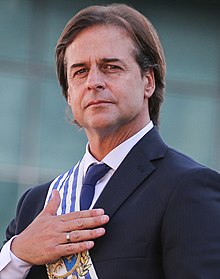 | |
| Presidency of Luis Lacalle Pou 1 March 2020 – present | |
President | |
|---|---|
| Cabinet | See list |
| Party | National |
| Election | 2019 |
| Seat | Executive Tower |
|
| |
| ||
|---|---|---|
Media gallery |
||
The presidency of Luis Lacalle Pou began on 1 March 2020 when he was inaugurated as the 42nd president of Uruguay. Lacalle Pou, a member of the National Party took office following his victory over the Broad Front nominee Daniel Martínez in the second round of the 2019 general election, which ended the 15-year leftist rule in the country and the return of National Party to the Executive since his own father was the president in 1990–1995.[1][2] On 16 December 2019, after his victory in the second round and before his inauguration, he announced his cabinet consisting of leaders of National, Colorado, Cabildo Abierto and Independent parties, members of the Multicolor Coalition.
Lacalle entered office just days before the outbreak of the COVID-19 pandemic, which dominated most of the political agenda during the first two years of his presidency.[3] Within the first 100 days, his administration sent a bill to the General Assembly under the label of "Urgent Consideration Law", and after being approved within certain constitutional deadlines, it introduced a series of significant reforms in areas such as public security and criminal law, economic and fiscal policy, and labor and environmental law.[4] In March 2022, almost halfway through Lacalle's term, after an opposition campaign, the electorate was asked in a referendum whether 135 articles of this law should be repealed.[5]
The Lacalle administration carried out a reform of the educational system and the retirement and pension law.[6] In March 2020, "Operation Safe Border" was launched in which thousands of troops from the three branches of the Armed Forces were deployed in the border areas with Brazil and Argentina to combat insecurity, smuggling and drug trafficking.[7] The foreign policy objective of the Lacalle administration is to achieve greater flexibility in the rules of the Southern Common Market to trade outside the bloc and expand the free trade area, which has caused strain within the organization towards its neighbouring countries.[8] Lacalle condemned the Russian invasion of Ukraine and Hamas as terrorism during the Israel–Hamas war, as well as accused Nicolás Maduro, Daniel Ortega and Miguel Díaz-Canel of leading dictatorial governments in their respective countries.[9][10]
During the drought that occurred between 2022 and 2023, Lacalle declared a state of "water emergency" on June 19, 2023 and tax exemptions for bottled water, as well as the construction of a new reservoir and pipeline for water transfer in the San José River.[11] Controversies in Lacalle administration include the Astesiano Case, in which Alejandro Astesiano, former chief custodian, who was dismissed from his position and subsequently arrested for forging Uruguayan identity cards and passports to Russian citizens.[12]
- ^ "Conservative Lacalle Pou wins Uruguay presidential election, ending 15 years of leftist rule". France 24. 2019-11-29. Retrieved 2021-01-14.
- ^ Politi, Daniel (2019-11-28). "Center-Right Candidate Wins in Uruguay, Ending 15 Years of Liberal Rule (Published 2019)". The New York Times. ISSN 0362-4331. Retrieved 2021-01-14.
- ^ "Lacalle Pou firmó decreto que pone fin a la emergencia sanitaria nacional". Montevideo Portal (in Spanish). Retrieved 2024-03-07.
- ^ Redacción. "Proyecto de ley de urgencia ingresó al Parlamento: "¡Cumplimos!", afirmó Lacalle". El Observador. Retrieved 2024-03-07.
- ^ "LUC: a un año del referéndum, gobierno celebra vigencia de una "ley clave" y exige "disculpas" del FA". EL PAIS (in Spanish). 2023-03-27. Retrieved 2024-03-07.
- ^ "Reforma de la seguridad social: cinco claves de los cambios ya vigentes en el sistema jubilatorio". EL PAIS (in Spanish). 2023-08-02. Retrieved 2024-03-07.
- ^ "Comienza despliegue militar en la frontera; Ministerio de Defensa moviliza 1.200 soldados". EL PAIS. 2020-03-17. Retrieved 2024-03-07.
- ^ "Mercosur tensions rise as Uruguay seeks trade deal outside bloc | Buenos Aires Times". www.batimes.com.ar. Retrieved 2024-03-07.
- ^ "Luis Lacalle Pou y Miguel Díaz-Canel: el duro choque verbal entre los presidentes de Uruguay y Cuba, y otros mandatarios, durante una cumbre en México". BBC News Mundo (in Spanish). Retrieved 2024-03-14.
- ^ "Uruguay expresó su apoyo a Israel y acompañó la condena mundial a los ataques de Hamás". EL PAIS (in Spanish). 2023-10-08. Retrieved 2024-03-07.
- ^ Redacción. "Nuevos precios del agua embotellada: así impactaría la exoneración de impuestos". El Observador. Retrieved 2024-03-07.
- ^ Fonseca, Iolanda (2022-10-25). "Uruguay's Lacalle Pou's chief custodian arrested for forging documents from presidential residence". The Rio Times. Retrieved 2024-03-07.


